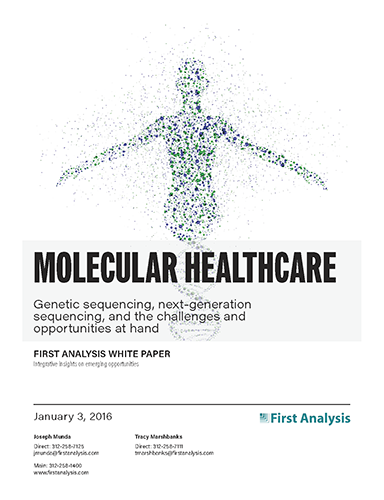White paper: Molecular healthcare
Genetic sequencing, next-generation sequencing, and the challenges and opportunities at hand

Molecular healthcare encompasses areas of industry development where we see significant opportunity over the next several years to improve healthcare outcomes and create substantial economic value.
While molecular healthcare includes genomics, lipidomics, proteomics, transcriptomics, microbiomics, and metabalomics, to name a few, in this report we focus on the fast-moving area of genomics and the early-innings impact next-generation sequencing (NGS) is having on the proliferation of molecular diagnostics in the clinical setting.
We estimate the NGS platform technology market to be ~$2.3 billion today and growing 20% annually with a total addressable market of ~$45 billion. This report reviews the market size, technology platforms, emerging trends, regulatory and reimbursement issues, as well as key growth drivers and moderators for NGS and the ~$7.7 billion molecular diagnostic industry.
We also review genetic sequencing basics and profile the key publicly traded and privately held innovators and major players.
TABLE OF CONTENTS
Includes profiles of 32 public and private companies
- Summary
- Fundamentals of genetic sequencing
- Next-generation sequencing
- Key NGS focus areas
- Sequencing company profiles
- Clinical diagnostics
- Data interpretation/bioinformatics and molecular diagnostic testing company profiles
Summary
The term “molecular healthcare” is one we use to describe the current impact and direction we see genomics and ancillary molecular testing taking in medicine. While other terms like “precision” or “personalized medicine” are used to describe the advances genomics and other technologies have made in healthcare, we contend the goals of precision or personalized medicine have yet to be achieved. We are of the view that the current practice of medicine remains an inexact science and still tends to be reactive rather than preventive, predictive, and accurate. Therefore, we feel “molecular healthcare” better characterizes the current state of genomics in medicine.
While we feel we are still in the early innings of unlocking the true potential of genomics, recent discoveries from sequencing the human genome and movement into the clinical setting have enhanced researchers’ ability to classify individuals into subpopulations by disease type or treatment method. In our view, the further development and use of molecular healthcare will be fueled by healthcare consumers gradually gaining a better understanding of the meaning and value of molecular information as well as clinicians being armed with the right tools and technologies to deal with the complexity of disease diagnosis, onset, progression, treatment, prognosis, and outcome.
To achieve the ultimate goal of precision or personalized medicine, further technological advances and infrastructure changes must be realized in the areas of sequencing, testing, and regulation. Although we think we are only in the first couple innings of the development of genomics applications in healthcare, the foundation for such an ecosystem is already being formed, and we believe molecular healthcare is a key early pillar leading to personalized healthcare.

Request full report
To access the full report, please provide your contact information in the form below. Thank you for your interest in First Analysis research.
